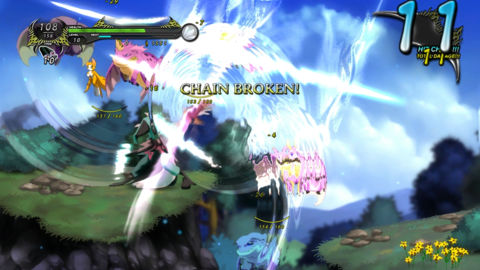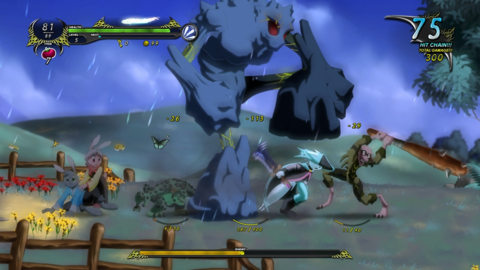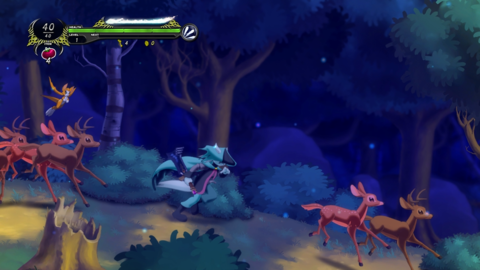
On first glance, Dust: An Elysian Tail looks like it has a little bit of everything. There's a responsive, lightning-fast combat system that lets you juggle enemies, suplex them out of the air, or combo them several screens high. You've got a full raft of RPG mechanics, so you can level up and distribute skill points, and equip armor and items that buff different attributes and add effects like health regen or increased drop rates. The equipment system goes a step further with a full crafting system that lets you build even better stuff than you can buy, and there's a ton of other peripheral secrets to discover in your travels. All these mechanics are gathered together in service of a memorable, well written storyline, and swaddled in some of the most lavishly produced 2D video game art seen anytime lately.
The core of what makes Dust so rewarding is the quality and immediacy of the combat. You start out with basic abilities to do things like pop enemies up into the air or dash behind them and do a turnaround attack, and soon you get a sword-twirling trick called the dust storm that allows you to juggle multiple enemies, and also amplify the spells spewed by your little flying rodent whatsit Fidget into screen-clearing dervishes of magical destruction. Using all your juggles and spells and other combat moves effectively will net you combo hit counts well into the hundreds, which is especially useful since you earn bonus experience for solid combos. Dust's feedback loop of combat and character progression makes you constantly feel like you're becoming more powerful all the way up to the last minutes of the game, and the controls are so quick and responsive that it just gets more and more fun as you start laying waste to a dozen enemies at a time with ever increasing style.
The game has picked up a reputation as a Metroidvania game, and Dust does have the grid-like map that's the hallmark of that sort of game, but the similarities to something like Shadow Complex are partially superficial. Dust doesn't offer a single contiguous world that you can navigate from end to end, but rather a bunch of different smaller areas that you warp between on a world map. And once you get inside one of those areas, the graph-paper map doesn't follow your every move; each map square only corresponds to an entire "screen" that might take you five minutes to work your way across. That expectation of using the map to pinpoint exactly where I was at all times kind of threw me for a loop when I first started playing Dust, since you still end up fumbling your way around a good bit within complex screens, but once you unlock the world map and get a feel for how everything is put together, the game makes perfect sense. It helps that Dust does share that central Metroidvania conceit of taunting you with areas you obviously don't have access to early on, then doling out abilities like a slide and double jump later on that give you access to those areas, giving you a lot of reason to backtrack.

Actually, I was surprised how much time I wanted to sink into going back and looking for secrets. The game is chock-a-block with hidden treasure chests that hold most of the best items and crafting recipes in the game, and a lot of those chests are very well hidden in clever places in the environment. Those are just the nuts-and-bolts secrets, though. What's even more memorable are the dozen notable characters taken from other Xbox Live Arcade indie games that are deeply hidden throughout Dust's expansive levels. It takes a lot of work to find some of these guys--one of the solutions had me getting a clue from a note I found in a completely different area, then kneeling in a specific spot like I was playing Simon's Quest all of a sudden--and they reward you with health bonuses when you find them. More importantly, you really have to see for yourself the amount of detail and craft that went into making each secret character's area feel visually and thematically consistent with the games they're taken from. Dust goes to the extreme lengths of changing its own art style, visual presentation, and mechanics in some cases to emulate and pay homage to these other standout downloadable games, the ranks of which this game is likely to join in the near future.
Aside from the secret stuff, Dust has a good 10 or more hours of pure story and side content, including a bunch of optional quests you can pick up from friendly characters in multiple towns. The game becomes occupied with some fairly dark themes, as you delve into the story of the skilled warrior Dust who, together with Fidget and his ancient talking sword, sets out on a quest to figure out who he is and where he came from. Yes, an amnesiac protagonist--I can hear you rolling your eyes from here. But the game's finely crafted storytelling efforts keep that clichéd premise from feeling out of place, even as the nature of the truth becomes more and more grim. The game encompasses a broader scope the more you play, as you realize who's involved in the central mystery and how much is at stake, and the story ultimately reaches a more satisfying and emotionally resonant conclusion than most 60 dollar retail games I can think of.

At the same time, Dust is almost paradoxically bursting with an ebullient brand of charm. There's a ton of referential and self-aware humor that makes light of video game conventions in general and a number of memorable games in particular. (The very first item you pick up is an amusing reference to Symphony of the Night, which is a clear influence here.) The game tastefully knows not to lean too heavily on this stuff, ensuring that it never crosses the line and becomes too cloying or corny. Dust juggles light and dark in a way that makes it easy for you to feel good about, even if you haven't spent any time seriously considering talking animal characters since the last time you watched An American Tail or Disney's Robin Hood. All this is enhanced by a cast of excellent voice actors who do both the jokes and the plot a service, giving uniformly well considered line readings that make you feel like someone who really knew and cared about the material was sitting there directing them the whole time.
That Dust is largely the work of one lone developer makes it all the more impressive, but the circumstances of the game's development aren't even a consideration when you consider how good the game is at face value. Cramming this many elements into a single downloadable game seems like an audacious move, but Dust pulls it off with confidence, style, and heart, resulting in a game that deserves to be played by a lot of people.